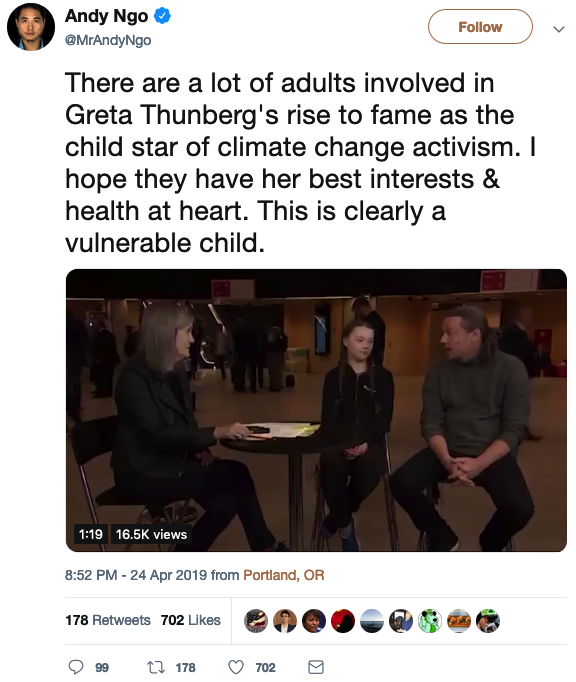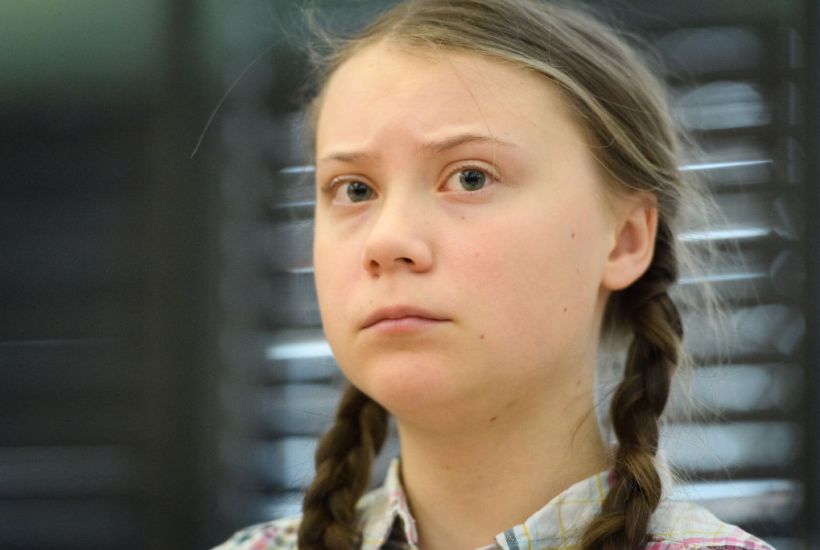Children have become the latest political pawn in the promotion of climate change catastrophism. As one of the best examples of the effectiveness of this approach is that of Greta Thunberg, the sixteen-year-old Swedish climate activist—or as Miranda Devine calls her the ‘eco-evangelist’—who has been so integral in organising the global school strike movement for climate change. Devine gives the following example of the “uncompromising rhetoric” of Thunberg’s “climate apocalypse”:
“Around the year 2030,” she says, “We will be in a position where we set off an irreversible chain reaction beyond human control, that will most likely lead to the end of our civilisation as we know it. That is unless in that time, permanent and unprecedented changes in all aspects of society have taken place.”
Now, Thunberg has not only briefly met the Pope—who encouraged her to “Keep doing what you’re doing”—but has also been named by Time magazine as one of the world’s 100 most influential people, been nominated for the Nobel Peace Prize, as well as being hailed by The Bulletin of Atomic Scientists as “the chief orator of her generation”.
However, it is Thunberg’s personal struggle with mental illness—and associated self-harm—which has been more influential in shaping her political activism than most people realise. Andy Ngo posted this interview to illustrate the problem perfectly.
 Devine says that when Thunberg was eleven she went through a serious psychological crisis. She became so disillusioned with life due to the existential threat supposedly posed by the burning of fossil fuels that she became fearful for the very existence of humanity. Greta said:
Devine says that when Thunberg was eleven she went through a serious psychological crisis. She became so disillusioned with life due to the existential threat supposedly posed by the burning of fossil fuels that she became fearful for the very existence of humanity. Greta said:
I became ill. I fell into depression. I stopped talking and I stopped eating. In two months, I lost about 10 kilograms of weight. Later on, I was diagnosed with Asperger’s Syndrome, OCD and selective mutism.
Recently, The Guardian reported that when addressing world leaders in Davos, Greta continued to preach that, “Our house is on fire… I want you to panic. I want you to feel the fear I feel every day.” Does that not betray an underlying sense of psychological pain and even trauma? Make no mistake. While Greta might be young, Swedish, and wears her hair in pigtails, she is no Pippi Longstocking. As Paulina Neuding writes in Quillette:
A workplace strike shows company owners and management that workers are able to harm them economically. A school strike, on the other hand, constitutes a form of self-harm, undertaken to attract adult attention. And the global school strike for climate is led by a girl with a long and tragic history of self-harm to her own body.
But there is a more insidious philosophy framing Thunberg’s underlying worldview. As Devine states, “Greta is passionate about climate justice, “the circular economy and rewilding nature”, without understanding the implicit Marxist ideology or its proven deadly consequences.”
Devine has presciently put her finger onto something. According to Thunberg’s autobiography, Scenes from the Heart (2018), which she co-authored with her father, mother and sister—but narrated in her mother’s voice—the dual phenomena of a “family in crisis” and a “planet in crisis” are inextricable linked. As Neuding states:
The book posits that oppression of women, minorities, and people with disabilities stem from the same overarching root problem as climate change: an unsustainable way of life. The family’s private crisis and the global climate crisis, the authors argue, are simply symptoms of the same systemic disorder.
But then, ironically, Neuding goes on to state:
Greta does not skip classes from just any school, but one for children with special needs. Many other Swedish families fight hard to get their children into such schools, because places are rare. According to [Greta’s] book, however, resources will be ample for such families once we change the system—including, according to Ernman [Greta’s mother], “patriarchal structures” that she claims favour boys with neuropsychiatric disorders over girls.
Ah, so we’re back to that old Cultural Marxist chestnut that it’s the patriarchy that is to blame! Except that as females, both Greta and her sister, have benefited enormously from the Swedish social welfare system, even if it still is ‘patriarchal’. But let’s not quibble about such inconvenient details that go against the prevailing socialist narrative of injustice.
Maybe the German TV-anchor, Maybrit Ilner, spoke better than she knew when she posed the question, “Is Greta the new Che Guevara?” Even Neuding saw the disastrous political implications for her climate change movement which that particular association might have for she quickly qualified:
In defence of the excellent Ms Ilner, she probably meant to refer to Che Guevara as a global political symbol. But the question is telling: Greta is turning into a revolutionary icon.
Ideas obviously have consequences. And it is the responsibility of parents to navigate those complex ideas as they explore the world. Especially if their children show signs of struggling psychologically. All of which is say, when people such as Madeleine Albright—let alone the Pope—encourage someone like Thunberg with the words “You go, girl”, maybe they should have been considerably more cautious, As Neuding herself concludes:
Greta was recently named “Woman of the Year” by a Swedish newspaper. But she is not a woman, she is a child. It is time we stopped to ask if we are using her, failing her, and even sacrificing her, for what we perceive to be a greater good…
Adults have a moral obligation to remain adults in relation to children and not be carried away by emotions, icons, selfies, images of mass protests, or messianic or revolutionary dreams.
Mark Powell is the Associate Pastor of Cornerstone Presbyterian Church, Strathfield.
Got something to add? Join the discussion and comment below.
Got something to add? Join the discussion and comment below.
Get 10 issues for just $10
Subscribe to The Spectator Australia today for the next 10 magazine issues, plus full online access, for just $10.


























Comments
Don't miss out
Join the conversation with other Spectator Australia readers. Subscribe to leave a comment.
SUBSCRIBEAlready a subscriber? Log in